Thursday, March 15th, 2012
Hyatt Regency Indianapolis
Presented by the Japan-America Society of Indiana (JASI), the “Japan Update” Conference was led by Japan's Ambassador to the United States Ichiro Fujisaki and Indiana Governor Mitch Daniels. Two distinguished panels of speakers represented leading agencies in Washington D.C. and the Japan-invested automakers in Indiana. The conference was held on March 15th at the Hyatt Regency Indianapolis, attended by two hundred guests from throughout the country, including New York, Virginia, Tennessee, Illinois, Michigan, Washington D.C., and other states. JASI thanks the many corporate sponsors and partner organizations which made possible the success of the event, in particular the National Association of Japan-America Societies. (See full list below).
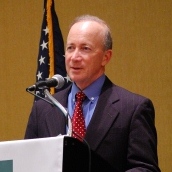
The Honorable
Mitch Daniels
Governor of Indiana
JASI President Pawel Fludzinski opened the program with a moment of silence observed for the victims following the one-year anniversary of the Great East Japan Earthquake. JASI dedicated much of the past year to facilitating the statewide relief campaign and raised almost $900,000 for relief and rebuilding in Japan.
Indiana Governor Mitch Daniels, who stressed the warm and strong friendship that has been built between the peoples of Indiana and Japan, said the shared friendship and strong bond captures the essence of kizuna, the Japanese word he learned from Mr. Tatsuhiro Shindo of JETRO Chicago. He expressed appreciation to Japan’s Ambassador Ichiro Fujisaki and recalled with sadness Japan’s tragedy, emphasizing the ongoing support of the people of Indiana for our friends in Japan. Governor Daniels also referenced the original name for the conference, “Japan Matters,” saying that without question Japan matters greatly to Indiana, citing Indiana’s number one ranking in job creation from foreign direct investment, primarily from Japan. He said the new gift of forty-five Japanese cherry trees to Indiana announced by Ambassador Fujisaki represents a long tradition of cultural ties and exchange between Japan and Indiana.
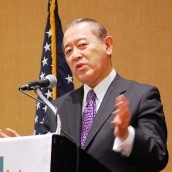
His Excellency
Ichiro Fujisaki
Ambassador Extraordinary and Plenipotentiary of Japan to the United States of America
Honorary Consul General of Japan at Indianapolis Robert H. Reynolds introduced Ambassador of Japan Ichiro Fujisaki who gave the Keynote Address. Ambassador of Japan Ichiro Fujisaki opened his address giving the reasons for his visit to Indiana as “A.B.C.D.F.” – A for art, B for business, C for cars and the importance of the automotive industry, D for Governor Daniels, E for the environment, and F for friendship. He added that Japan couldn’t have come through the tragedy of the earthquake and tsunami without Indiana and thanked Hoosiers for their generous support. The Ambassador focused on the current state of Japan’s economy, saying its challenges include a real GDP growth rate that is inconsistent, an aging population, and currency appreciation. He reviewed Japan’s global contribution and efforts, and its strengths represented by patent applications and R & D expenditures, as well as the small percentage of Japan’s CO2 emissions compared with other industrialized countries. He emphasized Japan’s commitment to high standard rules and compared the TPP (Trans Pacific Partnership) countries and Japan. Japan’s recovery since March 2011 has brought the GDP to nearly identical pre-disaster forecasts. He illustrated the dramatic reduction in nuclear power in Japan and brought into perspective the lower levels of discharged radioactivity from the Fukushima reactors as compared with Chernobyl. He also charted comparable levels of radiation in Japan, the U.S. and France. He stated that 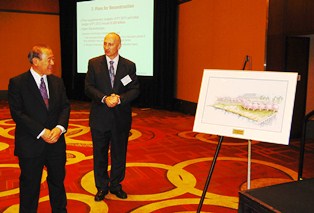 effective disaster response includes Preparation, Prompt Reaction, Prioritization, Public Understanding, and a Post Mortem Review, adding that Japan has the duty to share what it has learned with people around the world.
effective disaster response includes Preparation, Prompt Reaction, Prioritization, Public Understanding, and a Post Mortem Review, adding that Japan has the duty to share what it has learned with people around the world.
Following his address, Ambassador Fujisaki was presented with an artist’s drawing of the vision of White River State Park with the new Japan-U.S. Cherry Tree Promenade.
Panel: U.S. – Japan – Asia Policy Overview
Moderator and Panelist: Harrison Cook, Vice President, Eli Lilly and Company, Washington, D.C.
Panelist: Kiyoaki Aburaki, Keidanren (Japan Business Federation), Washington, D.C.
Panelist: Dr. Ellen Frost, Visiting Fellow, Peterson Institute, Washington, D.C.
Panelist: Dr. Daniel P. Aldrich, AAAS Fellow at USAID and Associate Professor, Purdue University
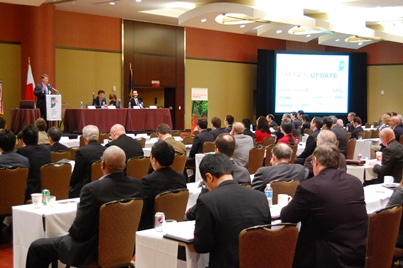 Harrison Cook said the panel would provide insight into the relationship between the U.S. and Japan in the context of regionalism, economic trends, growth potential, and Japan’s recovery from the earthquake, tsunami, and nuclear disasters. He pointed out that many U.S. leaders in Washington, D.C. need to be brought up to date on the reengagement with Japan.
Harrison Cook said the panel would provide insight into the relationship between the U.S. and Japan in the context of regionalism, economic trends, growth potential, and Japan’s recovery from the earthquake, tsunami, and nuclear disasters. He pointed out that many U.S. leaders in Washington, D.C. need to be brought up to date on the reengagement with Japan.
Kiyoaki Aburaki referenced the Yen/Dollar exchange rate, import and export trade, trends in the Nikkei 225, and consumption, saying that the data show great potential for the Japanese economy. Mr. Aburaki said the keys to Japan’s restoration in the aftermath of the disasters involve effective energy policies and international interactions and stated that a non-nuclear Japan is not feasible. He also described the Trans Pacific Partnership as an opportunity and anticipates exciting possibilities for U.S. – Japan collaboration in trade, technology, and people.
Ellen Frost explained that the U.S. is still popular in Japan and the relationship was strengthened by “Operation Tomodachi”. China’s assertiveness in the region, coupled with North Korea’s provocative activities, have further strengthened the Japan-U.S. alliance. The region is inching toward a single Asian market with ASEAN and free trade agreements creating a “noodle bowl” of complex relationships. She mentioned that Congress supports the Trans Pacific Partnership (TPP) due to the high standards that help U.S. companies compete in Asia; however, China opposes the TPP and views it as “encirclement.” Dr. Frost noted that “Made in China” is misleading because of complex modern supply chains and concluded by stating there is a lot of money in Asia and Asians are spending.
Daniel Aldrich addressed the importance of nuclear power in Japan as a primary source of energy and the new plan to reduce reliance on it in response to the disasters, as well as Japan’s future. Japan will have no nuclear reactors online by summer and the government is looking to other sources to fill the gap. He termed this as a sea change in Japan’s nuclear policy. Dr. Aldrich’s research shows the importance of human capital in the form of social networks regarding a community’s ability to recover from a disaster. The speed of recovery can vary from neighborhood to neighborhood depending on the existing bonds of friendship and connectivity already present in a community.
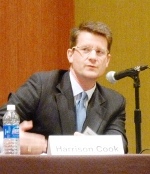 |
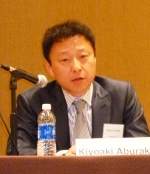 |
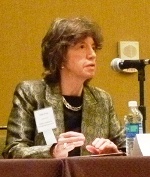 |
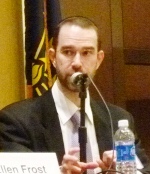 |
Harrison C. Cook Vice President, International Government Affairs Eli Lilly and Company, Washington D.C. |
Kiyoaki Aburaki Keidanren (Japan Business Federation), Washington, D.C. |
Ellen Frost Visiting Fellow, Peterson Institute for International Economics and National Defense University |
Daniel P. Aldrich AAAS Fellow at United States Agency for International Development, Associate Professor of Political Science Purdue University |
Panel: Perspectives from Japan-Invested Automotive Manufacturers
Moderator and Panelist: Kim Hill, Director, Center for Automotive Research, Ann Arbor, MI
Panelist: David Thomas, Plant Manager, Keihin North America, Greenfield, IN
Panelist: Jason Puckett, General Manager, Toyota Motor Manufacturing, Princeton, IN
Panelist: Andy Snider, Business Division Manager, Honda Manufacturing of Indiana, Greensburg, IN
Kim Hill introduced the panel and its focus as sharing perspectives on the impact of the disasters on the automotive industry in the context of supply chain management and future production trends and forecasts. The panel was viewed as bringing “good news” for the Japan Update attendees as the panelists were upbeat and positive in their forecasts for the industry. Kim Hill pointed out that U.S. auto sales are improving but economic challenges remain that impact the market. The recent recession, safety issues, the Great East Japan Earthquake, flooding in Thailand, the yen’s increase compared to the dollar, and the increasing market share of Hyundai and Kia have been major factors affecting the industry. However, with the projected sales and production estimates, he reported that suppliers may actually not have enough capacity to keep up with the upcoming high demand that is expected. He said Indiana with a diverse economy and favorable location in the Midwest is well-positioned to compete for new investment.
David Thomas introduced Keihin as a global producer of parts and systems for the automobile and transport industries with facilities in Greenfield and Muncie, Indiana. Its facilities and suppliers in Miyagi Prefecture were impacted by the earthquake and tsunami, in some cases with much structural damage. Several of the supply chain challenges that were faced included reduced port capacity, utility blackouts, and loss of lives and housing. Mr. Thomas described his company’s efforts to mobilize to assist others affected by the tragedy as well as minimize the impact on their own business and associates. Customer orders were reduced 50% through July 1st. Parts shortages required Keihin to cut costs and utilize voluntary leave and training programs to avoid layoffs during the period of lower production demand. He added Keihin has overcome these difficulties and emerged with stronger customer and employee relationships and a greater emphasis on localization of suppliers.
Jason Puckett stated safety is Toyota’s top priority and following the disasters the company focused on product normalization by avoiding layoffs, collaborating with suppliers, concentrating on speed of execution, managing risk, and standardizing parts. Toyota’s efforts will result in a more resilient supply chain in the future. He added they are localizing parts production and materials acquisition closer to their production centers and are planning to start Highlander production at their Princeton, Indiana plant. In assessing the market outlook, Mr. Puckett explained that the yen’s strength has resulted in cost cutting initiatives. Toyota has high expectations for 2012 and the upcoming four years.
Andy Snider reported that a large number of Honda suppliers were impacted by the earthquake and tsunami as well as Honda’s own facilities in the Tohoku region. A majority of Honda parts are localized but many “pass through” parts are sourced from Japan. Communication was crucial and was streamlined to prevent confusion and redundancy, with a single contact point identified for suppliers. Honda continues to evaluate purchasing activity to improve ability to respond to future disasters. Trends indicate a stronger economy and increased auto sales with an emphasis on technology and environmental considerations. Andy’s presentation also focused on Honda’s support of the people of Japan following the disasters, with U.S. Honda operations raising $1,700,000 for relief and associates providing 3,040 volunteer hours.
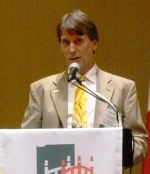 |
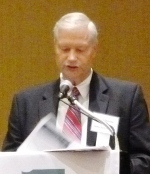 |
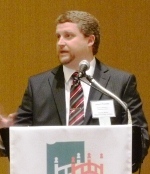 |
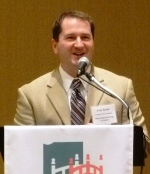 |
Kim Hill Director and Associate Research Director, Center for Automotive Research |
David Thomas
Plant Manger Keihin North America |
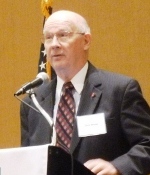
Dr. Richard Wood
A special guest at the conference was Dr. Richard Wood, retired, who offered closing remarks. Dr. Wood served as President of the New York Japan Society and Chairman of the Japan-United States Friendship Commission, and President of Earlham College. During the 1960’s, Dr. Wood spent a year living in Kesennuma, Miyagi, Prefecture, one of the towns hardest hit by last year’s tsunami. He reflected on the Tohoku region, saying just as Japan’s direct investment has been important to Indiana’s economy, the governors and mayors from Miyagi and Iwate Prefectures are actively seeking direct foreign investment to bolster and encourage their local economies and the rebuilding process. He encouraged U.S. entities to be a significant source of this investment.
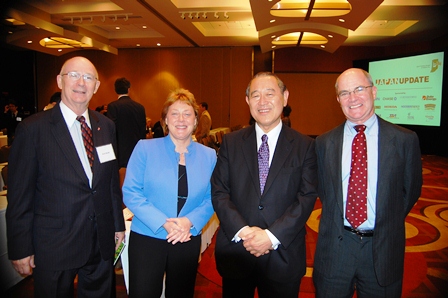 From left to right: Dr. Richard Wood, Theresa Kulczak, Executive Director, Japan-America Society of Indiana, His Excellency Ichiro Fujisaki Ambassador of Japan, Dr. Peter Kelley, President, National Association of Japan-America Societies From left to right: Dr. Richard Wood, Theresa Kulczak, Executive Director, Japan-America Society of Indiana, His Excellency Ichiro Fujisaki Ambassador of Japan, Dr. Peter Kelley, President, National Association of Japan-America Societies |
Conference Report prepared by Kevin B. Kelly, President, Jasper County Economic Development Organization, and Theresa Kulczak, Executive Director, Japan-America Society of Indiana
Click here to see the conference agenda.
Sponsored by:

Supporting Organization:
Consulate General of Japan at Chicago
Indiana Economic Development Association
Indiana Japan Chamber
Indiana Manufacturers Association
JETRO Chicago

